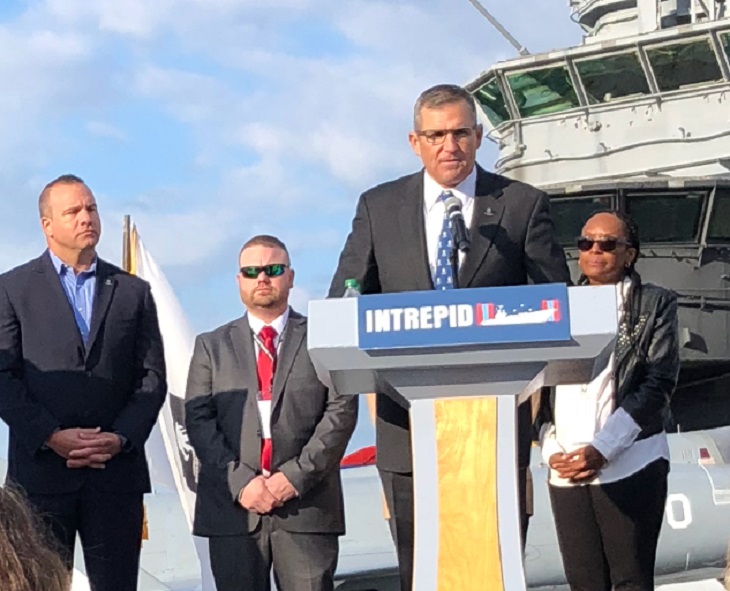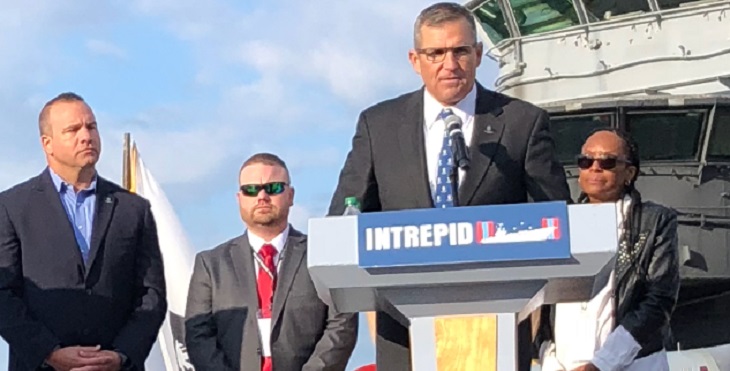
Michael Linnington, the chief executive officer (CEO) of Wounded Warrior Project, speaks to those attending the Warrior Care Network’s Five Year Commitment Announcement.
VA’s Acting Deputy Secretary James Byrne spoke at the Warrior Care Network’s Five Year Commitment Announcement Oct. 23 at the USS Intrepid: Sea, Air, and Space Museum in New York City where Wounded Warrior Project committed 160 million to mental health care for Veterans.
While there, Byrne presented a memorandum of agreement committing to four full-time VA liaisons at the Warrior Care Network – an innovative public-private partnership between VA, the Wounded Warrior Project, and four nationally recognized academic medical centers of excellence: Emory Healthcare, Massachusetts General Hospital, Rush University Medical Center, and UCLA Health that connect world-class care with thousands of warriors who otherwise might go untreated.

The Honorable James Byrne speaks at the Warrior Care Network’s Five Year Commitment Announcement.
These participating academic medical centers offer specialized clinical services through either a regional outpatient program and/or an innovative 2-to- 3-week intensive outpatient program.
VA Medical Centers, closest to the four academic medical centers, have each identified a social worker or nurse to serve as a Warrior Care Network VA liaison to transition and coordinate care between the network and VA for each Veteran.
The liaisons not only educate Veterans about their individualized VA benefits and services and facilitate enrolling them into the VA health care system, but also work with the clinical team at the academic medical center to ensure that the individualized care needed by the Veteran is continued when they transfer home and into care at the VA. This means scheduling needed VA appointments such as mental health, primary care, and specialty care, and fostering communication between the academic medical centers and VA treatment teams.
The liaisons also communicate the Veteran’s medical and mental health care needs, with particular emphasis on suicide risk, to VA’s Transition and Care Management teams, located at each of the 170 of the VA Medical Centers.
VA’s Transition and Care Management teams provide early screening for high-risk factors and psycho-social needs to determine most appropriate level of case management as service members and Veterans are at a particularly high risk for suicide. The personalized care coordination ensures a warm handoff of high-risk information across clinical teams, providing a safety net for Veterans.
VA is building on the success by growing the program: as the academic medical centers increase their ability to treat a larger number of Veterans, VA will increase the liaison coverage, making the position fulltime at each academic medical center.

Topics in this story
More Stories
Veteran Byron Potier weighed almost 300 pounds and was tired and lethargic. He was the perfect candidate for gastric sleeve surgery.
How much do you know about VA care, benefits and services? Don’t miss out on what you've earned—check out the "2025 VA Federal Benefits Guide for Veterans, Dependents, Survivors, and Caregivers" handbook to learn more.
Feeling stressed? Your breath can help you relax and focus. Take 3 minutes to reset and prioritize your well being for this week's #LiveWholeHealth practice.







As a former AF medic during the Vietnam Conflict, and a BHC clinician w/ over 40 years, I support increasing these liaisons.
I remain very concerned about the increasing suicide rates among combat vets. I’ve worked w/ vets from Korea who present w/ unresolved trauma and complicated grief as a direct result of repeated combat excursions.
Rich, MSW